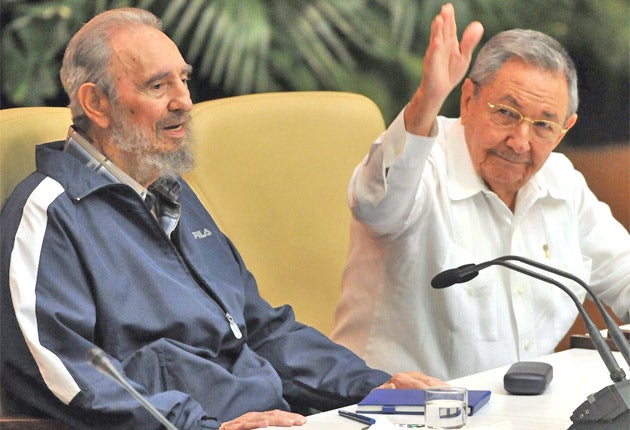Hopes of reform fade as veterans take control of Cuba's Communist Party
As a frail Fidel Castro relinquishes any power, old guard stand firm

Your support helps us to tell the story
From reproductive rights to climate change to Big Tech, The Independent is on the ground when the story is developing. Whether it's investigating the financials of Elon Musk's pro-Trump PAC or producing our latest documentary, 'The A Word', which shines a light on the American women fighting for reproductive rights, we know how important it is to parse out the facts from the messaging.
At such a critical moment in US history, we need reporters on the ground. Your donation allows us to keep sending journalists to speak to both sides of the story.
The Independent is trusted by Americans across the entire political spectrum. And unlike many other quality news outlets, we choose not to lock Americans out of our reporting and analysis with paywalls. We believe quality journalism should be available to everyone, paid for by those who can afford it.
Your support makes all the difference.Days after calling for fresh blood in the top tiers of the Communist regime in Cuba, Raul Castro yesterday took formal command of the party and named an 80-year-old veteran as his deputy, muddying his message of reform and change.
The appointments marked a climax to a four-day Communist Party congress in Havana that was eclipsed only by the appearance of Fidel Castro, who gingerly took his seat on stage next to his younger brother. Delegates learnt that Fidel, who led the 1959 socialist revolution, will for the first time no longer hold any party position.
That 79-year-old Raul Castro, who has effectively run the country since late 2006 because of a stomach infection that nearly killed Fidel, was appointed as first secretary of the party surprised no one. However, the choice of Jose Ramon Machado Ventura, who fought alongside Fidel to overthrow the US-backed Fulgencio Batista in 1959, as his deputy and Ramiro Valdes, 78, as his number three quashed hopes that a new generation of Cuban leaders could take on senior roles.
Another legacy of the congress – the first held by the party in 14 years – will be the ostensibly bold economic reforms that Castro Jr had been championing since last autumn and delegates approved on Monday evening. If enacted, they would bring radical change to life on an island which for now remains one of the last bastions of communism in the world.
Those proposals, which are likely to be adopted by the National Assembly in the coming weeks, are thought to include an authorisation to Cubans for the first time in more than 50 years to buy and sell private property, commerce which was severely restricted in the past. The state would push forward with the sacking of roughly one million state workers and the issuing of licences to open private business, while term limits are also expected to be imposed on the party leadership.
Observers in Havana reported seeing tears on the cheeks of many of the 1,000-odd delegates to the congress as an aide helped a frail Fidel navigate his way to his seat at the stage.
While he has made occasional public appearances over the last several months, it is a long time since he has been seen alongside his brother. In a newspaper column yesterday, Fidel tried to put to rest rumours that he had fallen out with Raul over the pace of his proposed reforms, saying he had seen them in advance of the congress and had approved.
He called the notion of term limits a "good idea", even though the subject has been taboo, not least because of his history of controlling life on the island for nearly 50 years without interruption or serious challenge.
Taken together, the economic reforms are an attempt to drag Cuba out of the dismal stasis of its centrally planned economy and offer some hope of improved standards of living. It is a difficult balancing act which aims to preserve the socialist edifice built by the Castro brothers while allowing the economy to take on some limited characteristics of traditional capitalism.
Castro told Cubans that he envisaged a phasing out of ration books. Also set to be eliminated is the dual-currency system, which involved running a parallel currency for tourists which was coveted by Cubans who sought access to it through black market dealing or simple theft. Economists have long argued that having two currencies was not viable in the longer term.
While the top layer of the 15-member Political Bureau remains geriatric, three new and younger figures were added. They are Marino Murillo, a former economy minister, who will be in charge of implementing the economic reforms, Mercedes Lopez Acea, the first secretary of the Communist Party in Havana, and the current economy minister Adel Izquierdo Rodriguez.
Elections to the much larger Central Committee showed that among its ranks were a larger number than usual of women, Cubans of African descent and aspiring younger party members.
Join our commenting forum
Join thought-provoking conversations, follow other Independent readers and see their replies
Comments